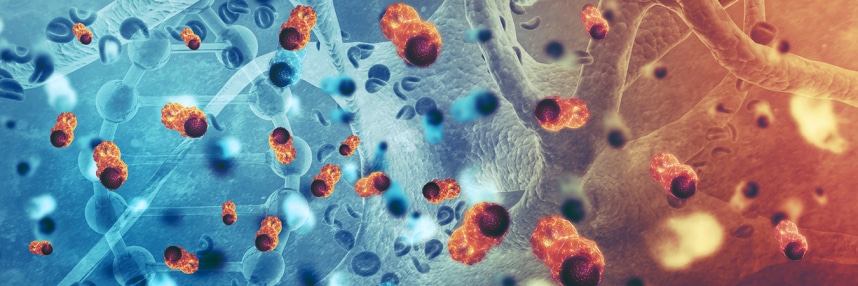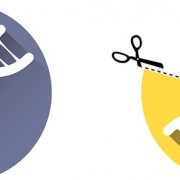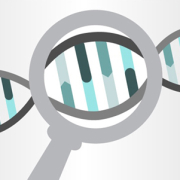Targeting oncogenes: a two-drug treatment
Is two better than one? We look at findings from a cancer study that explores a novel two-drug approach to treat rare ovarian cancer
Results from a recent clinical trial at the Royal Marsden Hospital showed that using two cancer-blocking drugs together could benefit patients whose cancers carry a hard-to-treat mutation in the KRAS gene.
KRAS mutations
The KRAS oncogene plays an important role in many human cancers, being mutated in around 30% of tumours.
The gene codes for a protein called K-Ras, and is part of a signalling pathway (RAS/MAPK) that instructs the cell to divide or specialise based on information from the cell surface.
When the pathway is functioning normally, K-Ras acts as a switch that turns this instruction on or off, but mutations cause it to stay on. In this state, it continuously transmits the message for cells to divide and proliferate.
KRAS mutations associated with cancer are somatic, meaning that they arise during a person’s lifetime, but mutations can also be inherited, resulting in rare conditions such as Noonan syndrome.
A target for treatment
KRAS mutations are associated with resistance to some types of treatment, as well as poorer outcomes in several cancer types, including colorectal cancer and lung cancer.
Because of these characteristics, the K-Ras protein would be a desirable target for drugs, but its structure does not offer any binding sites for a drug molecule to attach to and inactivate it. A better understanding the RAS/MAPK pathway has, however, revealed other drug targets that could be useful.
Cancer growth blockers
Cancer growth inhibitors are a class of drugs that aim to block growth factors that are telling cells to grow and divide uncontrollably. There are many kinds, targeting factors inside and outside cells, and in different pathways.
The MEK protein is part of the RAS/MAPK pathway and acts as a switch downstream from K-Ras, so inhibiting MEK can potentially stop the ‘always on’ message from K-Ras reaching the cell nucleus and prevent proliferation.
FAK inhibitors are a newer type of drug that inhibit focal adhesion kinase (FAK) – a protein involved in cell migration that is known to be overexpressed in many cancers.
A novel approach: combining drugs
In the trial, patients with low grade serous ovarian cancer were given a combination of a RAF/MEK inhibitor called VS-6766 and defactinib, a FAK inhibitor.
Low grade serous ovarian cancer is often less responsive to chemotherapy and hormone-based treatments than other ovarian cancers, so MEK inhibitors are already used for these patients, but resistance can develop quickly. The researchers hoped that adding a FAK inhibitor would make it more difficult for the tumour to become resistant to the treatment.
Of 24 patients in the Phase 1 trial, 46% saw their tumours shrink significantly. In patients with a KRAS mutation, this figure rose to a proportion of 64%. On average, cancer progression was stopped for around two years – much longer than with a MEK inhibitor alone.
“Scientists have been working to develop treatments that can effectively target KRAS-driven cancers for decades,” said the Institute of Cancer Research’s chief executive Professor Kristian Helin. “This study has turned a deep understanding of how cancer fuels its growth and develops resistance into a highly targeted treatment for patients who currently have few treatment options.”
This combination of drugs is now being examined in a wider trial for all solid tumour cancers.
–









